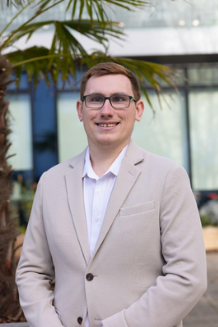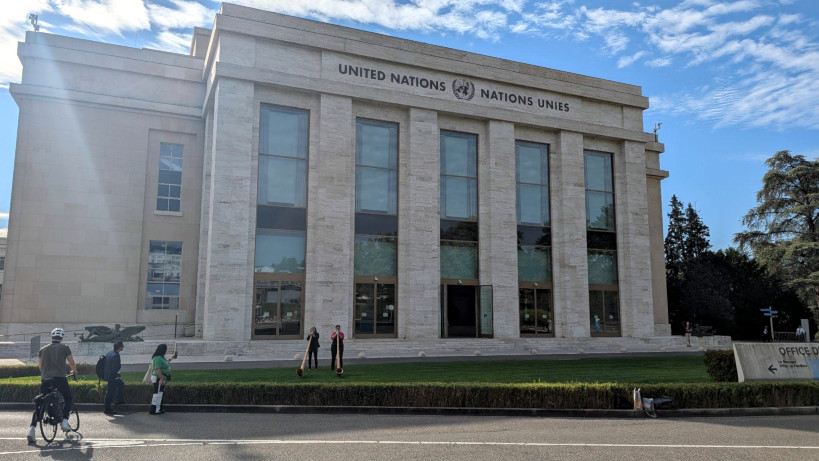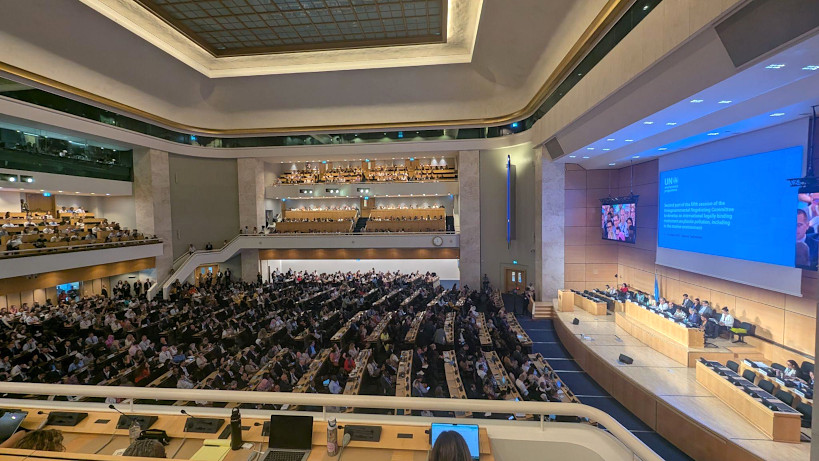
Day one of the final set of treaty negoations saw both an appeal to multilateralism and a demonstration of its inherent challenges. Sam Winton describes the events of a day in which the initial momentum generated by widespread determination to build a meaningful treaty has been threatened by delays, organisational problems and the inevitable opposition from the so-called “like minded group”. Is a fresh approach the only way to achieve true progess?
Geneva is the birthplace of modern multilateralism. It is perhaps unsurprising therefore that the future of multilateralism was on the mind of Ambassador Luis Vayas as he called the second part of the fifth session of the Intergovernmental Negotiating Committee to develop an international legally binding instrument on plastic pollution, including in the marine environment (INC-5.2), to order on Tuesday morning. In the opening remarks of Ambassador Vayas, UNEP Executive Director Andersen and Katrin Schneeberger, Director of the Federal Office for the Environment in Switzerland, a significant amount of time was spent opining on the role of multilateralism today. Director Schneeberger in particular referenced the challenges faced by multilateralism in an increasingly unsettled world. In many ways, it felt as if these opening statements were calling for more than just a treaty to address plastic pollution but also a demonstration that multilateral negotiation can still be effective. Nothing like piling on the pressure at the start of 10 days of negotiations!

Delegates were welcomed to the Palais des Nations by traditional Alphorn players as they gathered for the commencement of INC 5.2. Photo: Samuel Winton
Of course, the current state of the negotiations was also discussed in a characteristically optimistic tone by both Ambassador Vayas and Director Andersen. Director Andersen in particular praised a ‘surge in diplomacy’ she has observed since November ‘across regions and viewpoints’, describing the recent months as the most intense process of preparation she has ever observed for an environmental negotiation. Ambassador Vayas was keen to stress that the early days this week are crucial and it seems clear that he will expect rapid progress in contact groups and take action if this is not forthcoming.
In this spirit, after opening remarks, Ambassador Vayas moved quickly through the opening agenda items at the meeting. And set out an ambitious timeline for action in the opening week. On the afternoon of Day 1 we moved into Contact Group discussions and these are expected to conclude the first round of their work by Friday evening. In a plenary on Saturday, Ambassador Vayas expects Contact Groups to provide a draft text which is ‘as clean clean as possible’. By this point Contact Groups are expected to indicate which provisions have sufficient convergence for them to be forwarded for legal review, which provisions require further refinement (and how this will be achieved), and topics on which discussion should be deferred to the diplomatic conference or future COPs. Ambassador Vayas stressed that the text on Saturday would be a snapshot of current progress without prejudice to further discussion.
In the Chair’s scenario note circulated prior to the meeting he proposed to form the same Contact Groups which had operated at INC5.1 in Busan and, with 2 groups meeting in parallel, the provisional timetable for the week had paired Contact Groups 1&3 and Contact Groups 2&4. However, when seeking the committee’s assent to proceed with the proposed approach the Africa Group made it clear that they were unwilling to proceed with simultaneous meetings of Contact Groups 1&3. After some discussion, members agreed to alter the proposed schedule. This was an unfortunately messy start to a negotiation which must progress quickly. The Africa Group had made this position clear prior to the meeting and a procedural issue which should have been resolved by the Bureau was brought into the INC unnecessarily. In addition to providing an appearance of dysfunction in the leadership this late change left delegations scrambling to reallocate their workloads, causing unneeded confusion to start the week.

The committee gathered in the newly renovated UN Assembly Hall in Geneva for the opening plenary at INC 5.2. Photo: Samuel Winton
It had been Ambassador Vayas’s hope that the Contact Group meetings which commenced in the afternoon would make a rapid and productive start. Unfortunately this was not the case. I attended Contact Group 1 for a mammoth 5 hour opening session which overran by 2 hours, keeping the subsequent Contact Group meeting waiting outside the room for 30 minutes and, much to my disappointment, blowing through the Swiss Government’s evening welcome reception. The discussions focussed on 3 topics; definitions, scope and sustainable production. In all 3 there appears to be little convergence and we continue to have 2 distinct categories of countries as previously discussed, with their positions appearing to be just as entrenched as ever. In discussing definitions, one member rejected the treaty having a definition on plastic as ‘this agreement is not about plastic’, a comment followed up minutes later by another member stating ‘I was surprised that one member said that this agreement is not about plastic. If this agreement is not about plastic what is it about?’ to wide approval among observers. A coalition of members continues to outright reject any discussion of measures to reduce production and after 4 hours of discussions on these topics I saw no evidence that consensus on these issues was nearer than when I started following the process in Nairobi nearly 2 years ago.
The most disappointing aspect of this first Contact Group 1 meeting was an unproductive and inefficient procedure which seems to have been mandated by the negotiation leadership. We spent the session hearing general comments on each of the provisions and not conducting textual negotiations, while there was a significant lack of urgency and direction. Many members voiced their displeasure at this believing we are repeating well established viewpoints and not making meaningful progress. I am inclined to agree and it is my understanding that Contact Group 4 who met simultaneously rebelled and insisted on commencing textual negotiations, albeit at a painfully slow pace.
In the opening plenary, Ambassador Vayas described how he expected the Contact Groups to work. While each group has been given latitude to organise their work in the most efficient way, co-facilitators are expected to be active facilitators, bridging gaps and fostering shared ownership of the text. I have seen little evidence of that occurring today, with conversations following familiar and unproductive patterns. At the intended close of the session, the co-facilitators proposed that they would reflect on the interventions from the day and create bridging proposals on the articles discussed. This was a sensible suggestion which received wide support but was met with firm resistance from a group of members who felt that they had not conducted sufficient negotiations on the current text version. I believe the co-facilitators made a strategic error choosing to push back and continue to seek to gain assent for this approach in the face of objections. After a final hour of the contact group characterised by increasingly tense exchanges, the co-facilitators realised that any text they constructed would not be accepted by the Contact Group, no matter its content, and abandoned this approach with the new plan being to commence textual negotiations on the basis of the existing text next time the group discussed these topics. I fear this has led to a loss of trust in the co-facilitators with some members raising concerns about procedural justice. This trust will need to be rebuilt, though I note that the two co-facilitators of Contact Group 1 are particularly skilled in their roles and have always had wide respect from colleagues which I hope will mitigate any damage.
I feel that very soon the committee will need to get realistic about their intentions for this round of negotiations. The Like-Minded Group, which appears to have been joined by the USA under the Trump administration, has made it abundantly clear on this opening day that they will not consider upstream measures which will truly address plastic pollution. Ambitious members including the HAC will need to decide on a way forward and I see 3 paths:
- Accept a treaty with voluntary commitments on waste management and little else. Make this decision now to ensure that there is sufficient time to get this low ambition text finalised by August 14th. I do not advocate this approach and a clear majority of countries have committed to more than this.
- Stop pretending that the Like Minded Group can be persuaded to change their views and find procedural solutions to take the treaty out of their hands. This is probably going to require forcing a voting mechanism and will need widespread co-operation but would retain the possibility of achieving an ambitious treaty within the UN system.
- Accept that this UN process is unlikely to meet a successful conclusion and use the remaining time in Geneva to conduct informal conversations with a view to negotiating a treaty among ambitious members outside the UN system, a major blow for the modern multilateralism discussed in the morning plenary but a major achievement in the fight against plastic pollution
Executive Director Andersen stated this morning that she sees a path to agreement but it is narrow with steep drops on either side. I would add that it is currently heavily obscured by mountain fog but, if we are to find it again, we will need to find a way to move past the procedural deadlock where nations simply restate entrenched positions and find ways to make progress and share true bridging proposals. Despite transparency concerns I would therefore anticipate that we will soon be entering informal discussions where attempts will be made to find political compromise behind closed doors. For the time being, Contact Group discussions are expected to resume as scheduled on Wednesday morning and I will be there to see what progress can be made.
BIO
I am a postgraduate researcher working for the Revolution Plastics Institute at the University of Portsmouth since its creation in 2020. In 2023 I commenced my PhD studies titled ‘To what extent has the structure and implementation of the INC process facilitated the development of an effective Global Plastics Treaty?’ at the University of Portsmouth and the University of Surrey. This research will focus on how the structure and implementation of the INC process impact the treaty’s outcome, consider how the inclusion of stakeholders in the process influences a fair and just treaty, and investigate the implications of the final text for members. With a background in environmental hazards and community preparedness, my main research focus is working with communities and a broad range of stakeholders to tackle environmental challenges. I have also worked with international organisations to create policies to tackle the global plastics problem and facilitate sustainable development.

Thank you for this insightful post!
Your article offers a clear and compelling view of the inaugural day of INC-5.2—not just the anticipated momentum, but also how quickly procedural delays and organizational hiccups can derail even the most promising multilateral talks. I’m particularly struck by the irony highlighted in your opening: that the very birthplace of modern multilateralism—Geneva—was the setting for such early stumbling blocks. It underscores just how critical process design and operational efficiency are to meaningful diplomatic progress.
This underscores a broader question: Is it time to rethink the consensus-only framework, especially when interim procedural barriers threaten to stall urgent global actions on plastic pollution?
Looking forward to your continued coverage as these treaty talks unfold.